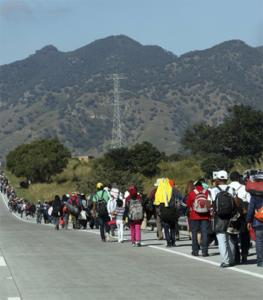Analysis – US border policy misses the point
As the US grapples with its immigration and border policies two things are currently happening that could have serious long term negative consequences for the US and  much of Central America.
much of Central America.
Firstly, the US is planning to close its border with Mexico and, secondly, the Trump administration is proposing a punitive cut of hundreds of millions of dollars in foreign aid to countries in Central America.
The plan is to cut $US500 million in aid to El Salvador, Guatemala and Honduras, where most of the asylum seekers the President wants to stop originate from.
But experts warn the two initiatives could prove counterproductive and result in a perfect storm of economic chaos and human misery. And they may further harm the residents of these crime-ridden, impoverished nations and trigger even more asylum seekers to get on the road.
Duke University professor of public policy and foreign aid expert Sarah Bermeo says that underpinning the caravans of Central American asylum seekers trying to get into the US is violence, climate change and lack of economic opportunity in El Salvador, Guatemala and Honduras.
“To combat these problems the US needs two strategies: A long-term foreign aid strategy to decrease the causes of forced migration and a short-term strategy for coping with the increase in asylum seekers at the border now,” Prof Bermeo said.
“Foreign aid can be directed to essential regional security initiatives to combat organized crime, as well as to in-country programs that build police capacity to counter gang influence,” she said.
“Food security assistance and aid for agriculture are needed to help residents cope with droughts in Central America’s dry corridor, which have resulted in people fleeing food insecurity.”
Prof Bermeo said that in the short term, migration from the most violent areas will continue, as people fear for their lives.
“Given this reality, policies that provide humanitarian assistance on arrival and a legal mechanism to stay temporarily in the US are better for security than current policy, which results in asylum-seekers pooling in unsafe conditions at the border,” she said.
And she said building will only force smugglers to use more secretive and dangerous ways to get people in the US.
“Continuing to create barriers for asylum-seekers will drive desperate people to use human traffickers to gain entry and disappear into the shadows,” Prof Bermeo said.
Other experts point to the fact that foreign aid isn’t a bribe to foreign leaders.
The Washington Post’s Michael Gerson says that aid often goes to non-governmental organisations to support public health, fair criminal justice systems and economic growth.
Even Trump’s erstwhile Homeland Security Secretary John Kelly said in 2017: “If we can improve the conditions – the lot of life of Hondurans, Guatemalans, Central Americans – we can do an awful lot to protect the southwest border”.
And the immediate result of President Trump’s talk of losing the border with Mexico is a rise in the number of families arriving at the border in recent months.
That has meant shifting resources from Immigration and Customs Enforcement activity in the US and moving agents from ports of entry — authorised border crossing points — to help manage the new arrivals.
Many of those arriving at the border quickly apply for asylum in the United States, adding to a backlog of asylum cases.
What President Trump is proposing is shutting those ports of entry, a move that would have the immediate result of stopping the almost $US2 billion in goods and services that cross the border between the United States and Mexico each day.
Hundreds of thousands of people, tourists and workers, also cross the border each day.
Some commentators have used the anecdotal line that closing the border would see the US run out of avocados in three weeks.
But there is doubt the move would stem the number of asylum seekers.
People seeking asylum in the US simply need to be on American soil when making a claim.
Most often, migrants cross the border illegally between ports of entry and turn themselves over to border agents to make an asylum claim.
Closing the border wouldn’t prevent that from happening — while potentially shutting down cross-border commerce.
Some observers say closing the border could trigger a deep recession, with farmers and car plant worker at particular risk.
But President Trump should know the importance of trade with Mexico. He recently vehemently promoted the United States-Mexico-Canada Agreement, his administration’s update to the North American Free Trade Agreement of 1993.
The two policy settings have been characterised by some US commentators as ‘dumb and dumber’. So maybe talk of border closures is just more bluster.
And maybe congress won’t let him take an axe to the US’ foreign aid budget.
This would amount to common sense. There are clear links between supporting Central America’s economies and stopping the flow of asylum seekers.
Laurie Nowell
AMES Australia Senior Journalist












